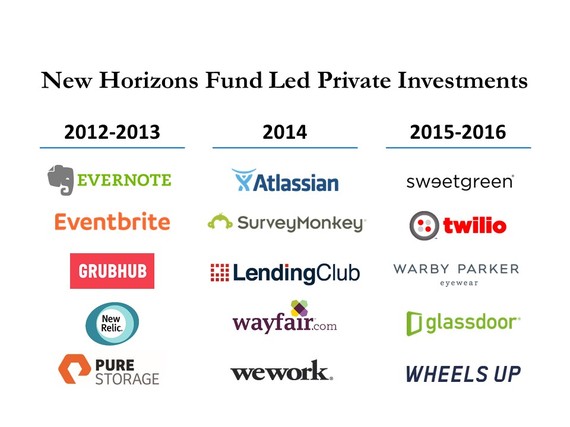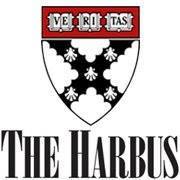By Lee Sun, Harvard Business School Class of '17 & Harbus Contributing Writer
The allure of Silicon Valley has grown in the eyes of HBS graduates since the Financial Crisis, and it is not surprising that more and more HBS'ers are leaving school to join start-ups. The MBA curriculum has tilted in the same direction although the shift of FIELD 3 back into EC year may signal a change. But why join one start-up when you can invest in many? Why bet your post-MBA career immediately on the success of an underdeveloped idea, when you can diversify your risk by betting on many different ideas?
I knew very little about growth investing so I went to interview the master. Henry Ellenbogen (HBS '98) was coined by Bloomberg as the "man who taught mutual funds how to invest in startups." Henry runs the New Horizons Fund at T. Rowe Price and invests in small, rapidly growing companies. His notable investments include Twitter, Netflix, and Work Day.
You have described growth investing as a complex problem, not a complicated problem, can you elaborate?
There is a difference between complex and complicated problems. Complicated systems are determinate, which means it is possible to clearly predict how changing a few inputs would affect the whole system. The car engine is a great example: once you have figured out the complicated mechanics, you know how it works. Complex problems, on the other hand, are indeterminate. Think of a chess game: each move leads to a new set of many potential responses. Growth investing is a complex problem because we are grappling with industries and companies that are on the forefront of change. We must interpret a continuous flow of new and often surprising data points.
How do you best tackle this complex problem?
Financial markets are made of people and machines, [and] people tend to copy what works. Market prices reflect people's assessment of current information but also historical information. The real world is very dynamic. Markets are very good discounting the past, but not discounting the future. Growth investing, either in early stage growth or durable growth, is inherently investing in sectors that are undergoing a lot of change. The companies themselves are also undergoing a lot of change. We study the underlying forces of change in great detail to make sure we approach each investment with the right framework. Take consumer businesses as an example: we need to look for companies that can understand and serve the needs of the millennial generation.
What do you think is unique about the millennial generation?
Consumer investing is behavioral. It is constantly changing, and social media is very important to the millennial generation. It is hard to know how to keep them loyal. Brands are leveraging paid media and the message itself is now more organic. Consistent traits and tastes are changing relatively quickly. If you study the past, retail investments are replication stories. Think of Starbucks and Chipotle: these companies perfect a box and then roll it out across the country. The key to success was to replicate with little deviation. With the millennial generation, retail companies are seeking for subscribers rather than "transactors." Millennials are not easily loyal to traditional brands like Coca Cola, but they can be loyal to brands that satisfy their own preferences.
When identifying the companies that will dictate how the next generation spends its time and money, what factors are most important to you? What signals give you confidence that such companies will have a strong Act II following their Act I?
Only a few companies ever get to a $1 billion valuation. Powerful Act 1 companies tend to have a large Target Addressable Market, great unit economics, and a management team that can get to a good scale. Netflix is a great example of having a powerful Act I and a strong Act II. We helped to recapitalize Netflix as it made its transition from DVD rentals to subscription content. We were comfortable [with] the likelihood that the company can successfully transform its business model. Netflix was an early leader with a sizeable customer base. The management team is strong and intellectually curious. The company tends to play offense instead of defense.
The competitor set was known (e.g., HBO, Amazon) and it was hard for the industry to be disrupted from the bottom.
Simplistically speaking, growth investing requires identifying great companies and having the patience to hold onto them. Are you ever tempted to trade through short-term volatility?
I took over the New Horizons Fund just before it turned 50. The return of the fund was mostly contributed by 30 stocks. If one of the PMs did not sell out of Walmart, it would have been as big as the whole fund today. The collective decisions of everyone are just as big as the decision to sell Walmart. This shows that we need to take advantage of compounding. We must remain true to a larger mission of strategic moves rather than constantly make tactical trades.
On a more personal note, what was your most memorable moment at HBS?
The most memorable would have to be the first few mini classes at the start of RC year. I remember being introduced to the case method, and the rapid fire of new concepts and new people definitely raised my anxiety level. For someone who did not come from a business background, I still recall The Beer Game to this day.
What is the most impactful part of HBS?
There are a lot of similarities between what I do today and what I learned at HBS. What you learn at HBS - there is a blocking and tackling of the case, and the analysis, but there are always one or two things that really matter. You have to learn the basics first, then learn to quickly identify the one or two derivative factors that matter the most. I continue to practice and refine this skill on a daily basis.
We understand that you are a very busy man. If now you suddenly get one more hour every day, how would you use it apart from work?
I'm pretty good at managing my time. Twice a year, I get away from the office to review my time management plan. Specifically, I think about how much time my team is allocating its time. For example, early stage growth vs. durable growth; meeting with boards vs. reading and thinking. It is never perfect, but it is usually pretty good. I'm trying to spend incrementally more time on quiet reflection. A couple of times a week, I get up early and write, about any topic. I really enjoyed carving out time to collate ideas - to do hard thinking.
Class of 1998 Section I produced more than 20 CEOs and founders of hot startups. If you did not become an investor, what would you have rather done?
I have always wanted to be an investor, but I would say investing can be viewed as an expression of the concepts you learn in science. Investing is about finding balance. I would argue political tensions - Europe or the US, is a reflection of imbalance; there has been too much focus on wealth creation. When I am searching for companies that will define the next generation, I firstly check for balance.
When you first joined T. Rowe Price, what surprised you the most about the firm?
How little structure there was - I decided how to spend my own time. A key part of this job is coming out with my own game plan, and allocating time accordingly. You have to differentiate yourself in order to lead to superior returns.
So what do you do to differentiate yourself?
One of the things that I study a lot is how the human brain works. Investing requires you to maintain a mental balance. Great investors can control their emotions. Take public market investing as an example: every morning I come to work, I am flooded with so much news and so many different price points that securities can transact at. You need to be able to detect the subtle signals through the market noises. This is counter to how the human brain is wired. I fundamentally do not believe in efficient markets, the human brain is emotional. Thus I spend a lot of time trying to understand how the human brain works.
What are your favorite part of Baltimore?
Baltimore is a great city. Within a 45 minute driving radius of the office, you can have any type of living environment you want. You can live near the water, you can live on a farm, or you can live in Washington D.C. Baltimore really is a unique place that caters to all tastes.
I have learned a lot today, thank you so much for your time, I hope to see you back on campus soon.
As I was about to exit Henry's office, I noticed his class card is actually placed right above his computer screen...
__________________________
Lee Sun (HBS '17), is a new writer aspiring to become an amateur financial news reporter. Starting out his career in a software start-up, then having a taste of engineering, investment banking, consulting and investment management, Lee is pursuing his passion for investing by interviewing top investors.



